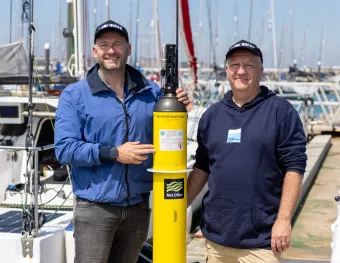
A British adventurer sailing single handed around the world – after first cycling and flying the earth’s circumference – has partnered with the UK’s National Oceanography Centre (NOC) to add ocean science to his latest one-man mission.
NOC ambassador James Ketchell will deploy a special ocean profiling instrument on his epic 30,000 nautical mile solo journey.
The Argo float is able to autonomously take critical measurements, such as temperature and salinity, down to 2,000m water depth in the ocean.
Ketchell’s mission, which launches on Sunday 22 September, from Gosport, UK, on his Class-40 yacht, comes as the global fleet of Argo floats hit a milestone of three million profiles, amounting to billions of individual measurements.
This data provides NOC and scientists globally with a unique insight into what is happening beneath the sea surface, which can impact everything from global weather trends to the health of marine ecosystems.
Ketchell, 42, says, “It’s a real honour and privilege to be able to deploy an Argo float and represent NOC. The Argo Programme revolutionised how ocean data is gathered, helping to feed global weather forecasting models and how we understand the climate.
“My project is about inspiring young people, instilling in them that sense of purpose and having a goal. This is such a great example of that, and I look forward to sharing this story on my journey and tracking where the float I deploy on its adventure, long after I’ve completed mine.”
There are more than 3,600 Argo floats globally, forming the international collaborative Argo programme, to which NOC contributes.
Dr Ben Moat, a physical oceanographer at NOC, says, “James’ mission, inspiring young people and helping to raise awareness and gather data about our ocean is a great example of how we can all play a part.
“Argo floats gather essential real-time data that are critical to improving our understanding of the ocean’s role in the Earth’s climate and to make improved estimates of how it will change in the future.”
Ketchell’s voyage is split into legs, stopping in Lanzarote, Cape Town, Melbourne, Punta Del Este in Uruguay, Antigua and New York, before arriving back into Gosport, UK.
Ketchell will deploy his Argo float, measuring around 1.5 m-long, in the Indian Ocean, after stopping in Cape Town. Once deployed, it will be able to be tracked, alongside the rest of the Argo float fleet, with its data freely and publicly available to download.
On his journey, Ketchell will also be supporting education around the ocean, through live streaming and visits to schools in the ports he visits.
Follow the journey
Find out more about James’ journey and follow his progress on his website.
Follow the journey of the Argo floats on the Euro-Argo fleet monitoring dashboard.
Watch our Into the Blue Podcast with James on his journey to becoming an adventurer
NOC, Euro-Argo ERIC and the Argo international programme
Around 25 nations currently support the Argo programme. Among them, 13 European countries joined their efforts, with the aspiration to provide 25% of the global OneArgo array. One of these 13 Members is UK Argo, a partnership between the Met Office, NOC and the British Antarctic Survey, that provides 3.7% of the global Argo array.
Since the first floats were deployed, their capabilities have advanced, with recent innovations, supported by NOC, including supporting the development and deployment of
Deep floats which can go down to 6,000m and BGC floats which are able to gather biogeochemical measurements. These latter are critical to understanding ocean and marine ecosystem health and the role of the ocean in global carbon cycling.
The British Oceanographic Data Centre, a part of NOC, operates the UK Argo Data Assembly Centre and works in partnership with other Euro-Argo ERIC members to process and deliver data to the Global Data Assembly Centres (Coriolis in France and US GODAE in the US), which makes it available freely, worldwide.
The Met Office also shares the real-time data worldwide via the World Meteorological Organisation Global Telecommunications System. Argo float data has made significant contributions to 6,447 published research papers.
Take a deep dive into the Argo network
To learn more about the Argo network and the aspirations for its future evolution, visit OneArgo.
To learn more about Euro-Argo ERIC, the European contribution to the Argo international programme, visit the Euro-Argo ERIC website.
Read more about some of NOC’s recent contributions to the Argo programme.